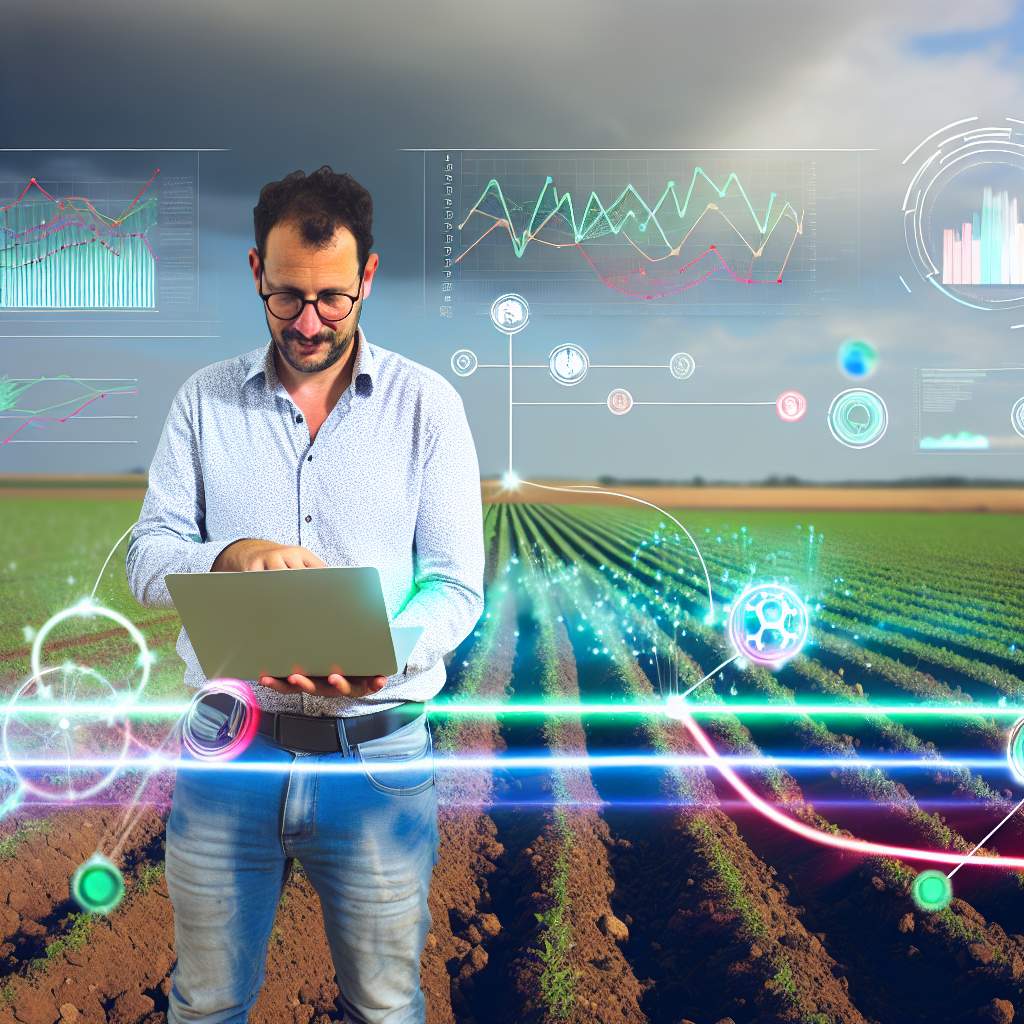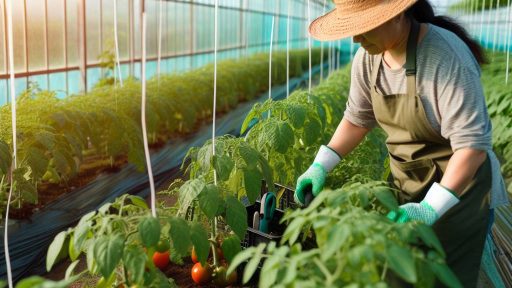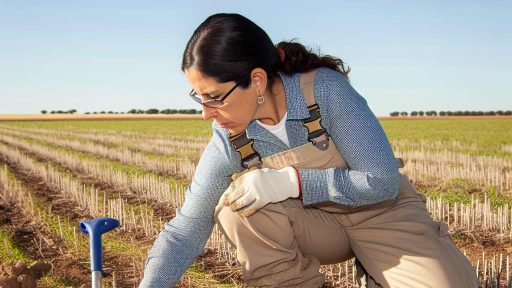Introduction to Data-Driven Farming and Its Relevance to Property Ventures
Data-driven farming utilizes advanced technologies and analytics.
This innovative approach enhances agricultural productivity and sustainability.
It integrates data collection, analysis, and application in farming practices.
As a result, farmers make more informed decisions.
Consequently, they optimize resource use, improve yields, and reduce waste.
Understanding Data-Driven Farming
Data-driven farming relies on various technologies, including sensors and IoT devices.
These tools help gather real-time data on soil health, weather conditions, and crop performance.
Moreover, analytics software interprets this data, guiding farmers in their operations.
Farmers can implement precision agriculture strategies based on insights gained from data.
Thus, they can tailor their approaches to specific field conditions.
Benefits for Property Ventures
Property ventures can greatly benefit from integrating data-driven farming.
This approach adds value to agricultural properties and enhances investment returns.
Moreover, it aligns with the increasing demand for sustainable practices.
Incorporating data-driven farming can attract environmentally-conscious investors.
Additionally, it may reduce operational costs by maximizing efficiency.
Transform Your Agribusiness
Unlock your farm's potential with expert advice tailored to your needs. Get actionable steps that drive real results.
Get StartedChallenges and Considerations
While integrating data-driven farming offers significant advantages, challenges exist.
Initial setup costs for technology and training can be substantial.
Furthermore, data management and security require attention and resources.
It is essential for property ventures to weigh these factors carefully.
Strategic planning can help mitigate risks associated with the transition.
The Future of Agriculture and Real Estate
The evolution of agriculture continues to impact real estate dynamics.
Data-driven farming will likely play a crucial role moving forward.
As climate change and resource scarcity intensify, innovative solutions will be vital.
Investing in data-driven farming aligns property ventures with future trends.
Ultimately, this integration bridges the gap between agriculture and sustainability.
Benefits of Integrating Data Analytics in Farming Practices
Enhanced Decision-Making
Data analytics empowers farmers to make informed decisions.
It allows for a better understanding of crop performance.
Farmers can predict yields with greater accuracy.
Moreover, data helps in identifying market trends.
Consequently, farmers can respond proactively to market demands.
Resource Optimization
Utilizing data enhances resource management efficiency.
Farmers can optimize water usage through precise irrigation scheduling.
Additionally, they can reduce fertilizer costs by analyzing soil conditions.
This leads to healthier crops and reduced environmental impact.
Furthermore, resource allocation becomes more efficient.
Improved Crop Monitoring
Data-driven farming provides advanced monitoring capabilities.
Farmers can track crop health in real-time.
Remote sensing technologies offer valuable insights.
Such tools enable early detection of diseases and pests.
Showcase Your Farming Business
Publish your professional farming services profile on our blog for a one-time fee of $200 and reach a dedicated audience of farmers and agribusiness owners.
Publish Your ProfileAs a result, timely interventions can significantly improve yields.
Cost Reduction
Integrating data analytics leads to significant cost savings.
Farmers can minimize waste by using resources more effectively.
Data helps in planning planting cycles to avoid overproduction.
Consequently, this can lead to lower operational costs.
Over time, these savings can enhance overall profitability.
Increased Sustainability
Data-driven practices contribute to sustainable farming.
Farmers can analyze environmental conditions for sustainable choices.
This approach helps in reducing the carbon footprint.
Moreover, it promotes biodiversity through effective land management.
Ultimately, these practices reinforce environmental stewardship.
Case Studies: Successful Integration of Data-Driven Solutions in Agriculture
Introduction to Data-Driven Solutions
Data-driven solutions revolutionize agriculture by enhancing decision-making.
Farmers utilize technology to analyze soil health, crop yields, and weather patterns.
This approach leads to increased efficiency and better resource management.
Case Study 1: GreenField Farms
GreenField Farms integrated precision agriculture techniques in their operations.
They used GPS technology to optimize planting patterns and fertilizer application.
This resulted in a 15% increase in overall crop yields.
Moreover, they reduced their chemical usage significantly.
Case Study 2: HarvestTech Innovations
HarvestTech Innovations implemented a data analytics platform tailored for farmers.
The platform collects data from sensors placed in fields.
Farmers receive real-time insights about soil moisture and nutrient levels.
Consequently, they achieve better irrigation practices and reduced water waste.
Case Study 3: EcoHarvest Produce
EcoHarvest Produce focused on sustainable farming practices using data analytics.
They implemented a climate monitoring system to assess environmental changes.
This allowed them to adjust planting dates and crop varieties accordingly.
As a result, they experienced a remarkable increase in productivity.
Lessons Learned from These Integrations
The integration of data-driven solutions proves beneficial for farmers.
It facilitates informed decision-making and optimizes resource usage.
Moreover, it enhances sustainability within agriculture.
Farmers who adopt these technologies can expect increased yields and profitability.
Through these successful examples, a clear business case for integration emerges.
See Related Content: The Role of Weed Control in Sustainable Land Development
Cost Considerations
Initial Investment
Integrating data-driven farming requires a significant initial investment.
This investment includes technology, training, and infrastructure upgrades.
Farms must purchase advanced equipment like drones and precision sensors.
Moreover, software systems to analyze data also come at a cost.
Companies like AgriTech Solutions provide essential tools for this transformation.
Training employees is another crucial expense to consider.
Farmers need to learn how to utilize new technologies effectively.
Long-term Savings
Despite the initial costs, data-driven farming provides substantial long-term savings.
Showcase Your Farming Business
Publish your professional farming services profile on our blog for a one-time fee of $200 and reach a dedicated audience of farmers and agribusiness owners.
Publish Your ProfileImproved resource management lowers operating expenses over time.
For example, smart irrigation systems can significantly reduce water use.
This efficiency leads to lower utility bills and resource conservation.
Additionally, precise data leads to optimized yields and higher profits.
Reduction in waste also contributes to overall cost savings.
Long-term data collection enables better decision-making in planning.
Return on Investment
Evaluating the return on investment is critical in property ventures.
Many farmers report increased crop yields after adopting data-driven practices.
Studies show that complete integration can yield a return in under five years.
This timeframe varies based on the farm size and the technologies implemented.
Hence, understanding the long-term financial benefits is vital.
Investors often seek these data-driven methods for consistent growth.
Improving profitability increases the attractiveness of property ventures.
Case Studies of Successful Integration
Several farms illustrate the successful integration of data-driven farming.
Green Valley Farms implemented a drone system for crop monitoring.
They decreased resource usage and increased their overall yield by 30%.
Sunrise Orchards also embraced precision agriculture technology.
As a result, they achieved a measurable reduction in costs.
These examples highlight the feasible benefits of this approach.
Investors can draw inspiration from their success in scaling operations.
See Related Content: Fertilizer Management for Sustainable Wheat Farming in the USA
Regulatory Compliance and Sustainability: Aligning Farming with Modern Standards
The Importance of Compliance
Regulatory compliance is critical for modern agriculture.
It ensures farms adhere to necessary laws and standards.
Consequently, farmers avoid potential legal penalties.
This compliance enhances the reputation of agricultural ventures.
Sustainability in Agriculture
Sustainable farming practices benefit both the environment and businesses.
These practices reduce resource consumption and waste generation.
Moreover, they promote biodiversity and soil health.
Farmers can retain customer loyalty through sustainability efforts.
Adhering to Standards
Farmers must align their practices with local and global standards.
This alignment helps secure access to markets and funding.
Many consumers prefer products from compliant farms.
Thus, this can increase profitability and market share.
Investment in Technology
Integrating technology simplifies tracking compliance requirements.
Data-driven tools can monitor environmental impacts efficiently.
Additionally, farmers can optimize operations using analytics.
This technology-driven approach enhances productivity and sustainability.
Environmental Stewardship
Implementing sustainable practices showcases a commitment to environmental stewardship.
This commitment attracts partnerships and investments.
Furthermore, it contributes to community health and well-being.
Showcase Your Farming Business
Publish your professional farming services profile on our blog for a one-time fee of $200 and reach a dedicated audience of farmers and agribusiness owners.
Publish Your ProfileThese benefits are essential for long-term business viability.
See Related Content: Greenhouse Cultivation for Reducing Water Usage in Agriculture

Technological Advancements in Agriculture
Data-Driven Tools for Farmers
Data-driven farming relies heavily on various technological tools.
These tools enhance decision-making for farmers across the globe.
Farm management software allows for streamlined operations.
Similarly, drones are increasingly used for aerial imaging.
Moreover, precision agriculture employs GPS technology effectively.
It enables farmers to monitor crop health remotely.
Platforms Supporting Data Integration
Numerous platforms help integrate data seamlessly in agriculture.
Cloud-based solutions are ideal for real-time data analysis.
Additionally, IoT devices collect valuable field data consistently.
Platforms like AgLeader and Trimble facilitate efficient data management.
These platforms boost productivity and minimize waste overall.
The Role of Big Data in Agriculture
Big data analytics allows farmers to harness large datasets.
It identifies trends and improves yield forecasting effectively.
Furthermore, machine learning algorithms enhance data interpretation.
This results in actionable insights for better crop management.
Consequently, businesses can reduce costs through informed decisions.
Benefits of Integrating Technology
Integrating technology into farming offers numerous benefits.
First, it increases efficiency in resource utilization.
Next, it enhances crop quality and quantity significantly.
Moreover, data-driven farming promotes sustainability efforts.
Lastly, it helps mitigate risks associated with weather unpredictability.
See Related Content: Pest And Disease Forecasting For Effective Crop Management
Market Trends: Investor Interest in Data-Driven Agricultural Ventures
Growing Interest in Agricultural Technology
Investor interest in agricultural technology is rapidly increasing.
Many venture capitalists now consider ag-tech a promising sector.
This trend reflects a broader recognition of sustainability.
Data-driven farming leads to more efficient agricultural practices.
Increased Investment Opportunities
Data analytics enhances decision-making in agriculture.
Investors are keen on startups that leverage big data.
These companies offer insights from soil health to market trends.
This results in more sustainable farming techniques.
Consumer Demand for Transparency
Today’s consumers prioritize transparency in food production.
Data-driven farming provides traceability from farm to table.
This transparency builds consumer trust in agricultural products.
Investors see this as a valuable market differentiator.
Government Support and Policy Changes
Government initiatives are increasingly supporting sustainable practices.
Many countries now offer incentives for data-driven farming.
This creates a favorable climate for investment in agriculture.
Moreover, evolving regulations encourage innovation in farming.
Showcase Your Farming Business
Publish your professional farming services profile on our blog for a one-time fee of $200 and reach a dedicated audience of farmers and agribusiness owners.
Publish Your ProfileCollaboration and Partnerships in the Ag-Tech Sector
Ag-tech companies are increasingly forming partnerships.
Collaboration with traditional farms enhances operational efficiencies.
This cross-industry synergy attracts further investment.
Potential investors view these alliances as beneficial for growth.
Emerging Technologies Driving Change
Technological advancements are transforming agricultural landscapes.
Use of IoT devices and precision farming tools is becoming common.
These innovations improve crop yields and reduce waste.
Investors recognize the potential for substantial returns.
Future Outlook: The Evolving Role of Data in Property and Farming Integration
Enhanced Decision-Making
Data-driven farming empowers property ventures to make informed decisions.
It provides insights that improve land usage and crop management.
Consequently, businesses can maximize profitability and minimize waste.
Increased Efficiency
Integrating data analytics boosts operational efficiency in farming practices.
Technology can automate irrigation systems and optimize resource allocation.
This integration decreases labor costs and environmental impacts.
Consumer Demand for Transparency
Today’s consumers prioritize transparency in food sourcing and sustainability.
Data provides clarity on farming practices and land usage.
As a result, property ventures can enhance brand trust and customer loyalty.
Regulatory Compliance
Data management helps businesses adhere to agricultural regulations.
It simplifies reporting and compliance tracking significantly.
Thus, organizations can avoid legal pitfalls associated with agricultural operations.
Future Technologies and Innovations
Emerging technologies promise to revolutionize the integration of farming and property management.
For instance, drone technology offers aerial insights into crop conditions.
On the other hand, AI-driven analytics can forecast crop yields accurately.
Collaborative Opportunities
Integrating data offers opportunities for partnerships between real estate and agriculture sectors.
Collaboration can lead to innovative solutions for sustainable land use.
Moreover, these partnerships can create value-added services for investors.
Implications of Data Integration
Ultimately, the future of property ventures lies in data integration with farming practices.
This approach promotes sustainability, efficiency, and profitability.
Therefore, investors must embrace data-driven strategies to remain competitive.
Additional Resources
Artificial intelligence on the agro-industry in the United States of …




